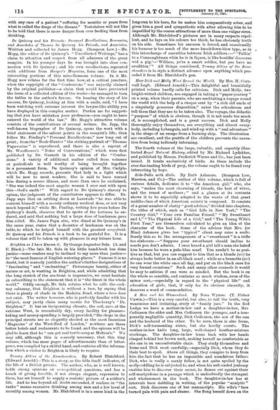De Quincey and his Friends : Personal Recollections, Souvenirs, and
Anecdotes of '!'homes De Quincey. his Friends, and Associates. Written and collected by James Hogg. (Sampson Low.) —Mr. Hogg, the editor of De Quincey's " Uncollected Writings," has a claim to attention and respect from all admirers of the great essayist. In his younger days he was brought into close con- nection with De Quincey ; and his own recollections, reprinted with additions from Harper's Magazine, form one of the most interesting portions of this miscellaneous volume. In it Mr. Hogg now relates for the first time how, at a critical juncture, when the copyright of the " Confessions " was unjustly claimed by the original publisher—a claim that would have prevented the issue of a collected edition of the works—he managed to turn the tables in the author's favour. On hearing the story of his success, De Quincey, looking at him with a smile, said, " I have been watching with extreme interest the lawyer-like ability you have displayed in this complex matter. Pardon me for suggest- ing that you have mistaken your profession—you ought to have entered the world of the law." Mr. Hogg's attractive volume consists of the contributions of several writers. Dr. Japp, the well-known biographer of De Quincey, opens the work with a brief statement of the salient points in the essayist's life; then follow Mr. Findlay's "Personal Recollections," now long out of print ; from the " Book-Hunter " the striking portrait of " Thomas Papaverius " is reproduced, and there is also a reprint of Mr. Woodhouse's "Notes of Conversations," which were first published by Dr. Garnett in his edition of the "Confes- sions." A variety of additional matter culled from volumes or periodicals is well worthy of being brought together in a permanent form. De Quincey's opinion of Mrs. Carlyle, which Mr. Hogg records, presents that lady in a light which will be new to most readers. She is said to have nursed him during a severe illness, and more than once he exclaimed, " She was indeed the most angelic woman I ever met with upon this—God's earth ! " With regard to De Quincey's slavery to opium, the judgment of the contributors appears to differ. Dr. Japp says that on settling down at Lasswade " he was able to content himself with a merely ordinary medical dose, or not very much beyond it," while Mr. Findlay, writing five years before De Quincey's death, observes that he spoke of the tortures he en- dured, and said that nothing but a large dose of laudanum gave him relief. Mr. James Payn also, who dined at De Quincey's in the same year, states that a decanter of laudanum was on the table, to which he helped himself with the greatest sang-froid. De Quincey and his Friends is a book to be grateful for. It is a volume that will be taken up with pleasure in any leisure hour.


















































 Previous page
Previous page